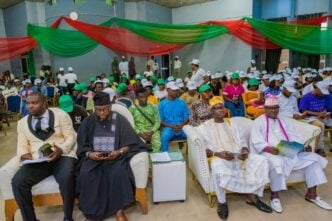JR Farms, one of the leading players in Nigeria’s agribusiness sector, and the Cross River state government have partnered to develop a 30,000-hectare coffee plantation across the state’s 18 local government areas over the next five years.
In a statement on Monday, Olawale Rotimi-Opeyemi, founder and CEO of JR Farms, said the move was aimed at expanding the coffee value chain and positioning Cross River as a key player in Nigeria’s coffee production.
According to him, his firm will work with the Cross River State Ministry of Agriculture and Irrigation Development on the initiative, which is to begin in the coming months.
He disclosed that in preparation for the commencement of the initiative, he, alongside Johnson Ebokpo, the state’s commissioner for agriculture, and other relevant stakeholders, visited some communities in the state, where they had engagements with farmers and local authorities.
Advertisement
Olawale, who met with Peter Odey, acting governor of the state, on Friday to discuss the initiative, highlighted its potential to boost coffee production in Nigeria, adding that the partnership aligns with his company’s mission to revolutionise agribusiness through sustainable partnerships and impactful investments.
“We are excited about this collaboration with the Cross River State Government. Coffee production presents a significant opportunity for economic transformation, and by leveraging Cross River’s rich agricultural resources, we aim to establish a robust coffee value chain that benefits local farmers and the broader economy,” Olawale said.
“As a state with both high lands and flat lands, temperate climate, good soil, water bodies and large agrarian communities, Cross River is uniquely positioned to grow both Arabica and Robusta coffee and become a leading coffee producer and exporter in Nigeria.”
Advertisement
The JR Farms CEO, however, revealed that the initiative would commence with the cultivation of Arabica coffee in Boki and Obanliku local government areas of the state, as these regions possess the necessary highlands and favourable climatic conditions for optimal coffee growth.
On his part, Ebokpo expressed optimism that the initiative would enhance the state’s agricultural output, create employment opportunities, attract investment in the coffee production industry, and position Cross River as a leading producer of high-quality coffee beans in Nigeria.
The commissioner reaffirmed the state government’s commitment to fostering collaborations that drive economic growth and sustainable development.
“The development of a 30,000-hectare coffee plantation will not only boost Cross River’s agricultural economy but also create jobs for thousands of our people, especially in rural communities. We are committed to supporting initiatives that enhance our state’s economic diversification,” he said.
Advertisement














